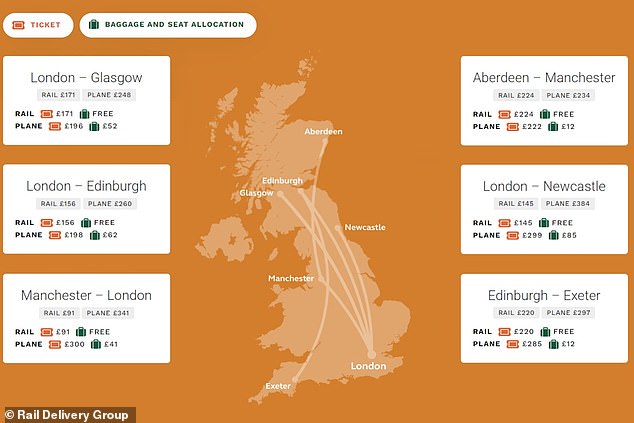How much will your summer holiday in the UK cost? Find out if you can travel cheaper by train or plane, after you’ve factored in all the costs

It is a long-held theory that flying in the UK is much cheaper than taking the train, and this is often true when you compare ticket prices.
But rail industry executives have published new research which they say shows that rail travel on comparable routes can be up to 70 percent cheaper than air travel, once you factor in extra costs such as hold luggage and seat selection.
They also found that air travel takes longer than door-to-door rail travel for four of the six domestic routes studied, and that rail is up to 17 times more environmentally friendly than flying.
According to the Rail Delivery Group (RDG), trains are £250 cheaper than flights on the London to Manchester route, which has seven times more train connections than flights.
The routes examined were London to Glasgow; London to Edinburgh; Manchester to London; Aberdeen to Manchester; London to Newcastle and Edinburgh to Exeter.
But there was no mention of prolonged strikes that have crippled services in recent years, or of poor performance that has seen cancellations in England and Wales rise by 8% over the past year, or of a 5% increase in average train tickets in March.
It comes as government legislation aimed at nationalising the UK’s train service moves closer to being passed following Labour’s election victory.

The Rail Delivery Group’s research compared the cost of a city-to-city journey by train and plane
According to the RDG, rail travel offers greater convenience and flexibility, with more frequent departures and direct access to city centres. In addition, rail travel is faster than flying on four out of six routes in terms of total journey time, including airport transfers and security checks.
The research, published last Friday, looked at the average cost of a ticket between selected routes for a one-way journey departing on August 5 and a one-way journey returning on August 9. This gave the total combined cost for both one-way journeys.
The route from London to Glasgow cost £171 by train and £248 by plane, including £196 for tickets and £52 for luggage and seat allocation. London to Edinburgh cost £156 by train or £260 by plane.
From Manchester to London the train cost £91 and the plane £341. From London to Newcastle the train cost £145 and the plane £384. From Edinburgh to Exeter the train cost £220 and the plane £297. And from Aberdeen to Manchester it was much closer, at £224 by train or £234 by plane.

The RDG study also looked at the difference in total travel time between trains and planes
The report says the public is ‘often told that domestic flights are faster, cheaper and more convenient’.
But the RDG described this as a “myth that is reinforced by quick comparisons that typically fail to take into account the time taken through airport security checks and the additional costs of baggage and seat selection”.
The research found that many comparisons fail to take into account the time it takes to travel to and from the airport and ‘forget that train stations are in convenient, central locations, while airports are on the outskirts of our cities’.
The RDG pointed out that air travel often involves travelling from the city centre to the airport. It also said passengers should take into account the recommended time to arrive at the airport before the scheduled departure time, as well as the estimated 30 minutes to disembark and the onward journey to the city centre.

This RDG graph compares the number of direct services between destinations
It was said that this could add three and a half hours to a journey in total. Flying from city centre to city centre took longer on four of the six routes assessed.
The four routes that were faster by train were London to Glasgow (15 minutes faster by train); London to Edinburgh (20 minutes), London to Manchester (2 hours 24 minutes); and London to Newcastle (2 hours 3 minutes).
However, from Aberdeen to Manchester the flight was 56 minutes faster, from Edinburgh to Exeter the flight was 2 hours and 42 minutes faster.
The RDG added that environmental considerations should also be taken into account, saying that business travel by train between Edinburgh and London is 17 times more environmentally friendly than by plane.
The research found that 3.4 million people flew between London and Edinburgh in 2019, making it the second busiest air route in Europe and emitting 244,000 tonnes of CO2 per year.

The RDG also compared the environmental impacts of train travel with those of flying.
The data compared a business trip by plane and by train, showing that the journey from London to Glasgow is seven times greener by train, from London to Newcastle twelve times greener and from London to Manchester nine times greener.
The report found that comparable data on aircraft and rail carbon emissions is not available for the Edinburgh-Exeter and Aberdeen-Manchester routes.
In addition, the RDG pointed out that a Railcard entitles you to a one-third discount on train travel on every route, taking the price from London to Glasgow from £171 to £113; and from London to Edinburgh from £156 to £103.
The price from Manchester to London drops from £91 to £60; from Aberdeen to Manchester from £224 to £148; from London to Newcastle from £145 to £96; and from Edinburgh to Exeter from £220 to £145.
The RDG also noted that airport transfers represent a significant cost item for customers, although these are not included in the cost analysis in the report.

London King’s Cross station, from where trains run to Newcastle and Edinburgh, on July 19
The research found that the average return price of a minicab to the city centre was £122 to £228 for London Heathrow, £140 for Luton, £130 for Stansted, £113 for Gatwick and £75 to £85 for City.
Elsewhere it was £55 to £70 for Manchester, £80 for Edinburgh, £71 for Glasgow, £60 for Newcastle and Exeter, and £40 to £50 for Aberdeen.
The report concluded: ‘For too long the story has been that domestic flights are cheaper and faster. But when you do a real cost comparison, rail travel is significantly cheaper.
‘Travelling by rail offers a cheaper, more sustainable and more convenient way to travel. Our research highlights the many benefits that rail travel offers our customers when travelling within the UK.
‘We selected six domestic routes offering both trains and flights so we could make a fair comparison of costs, carbon emissions and service availability.’

The research found that the time spent at airports waiting for flights (London Stansted pictured)
And RDG chief executive Jaqueline Starr said: “It’s time to rethink domestic travel this summer. On a like-for-like basis with air travel, rail is often cheaper, more sustainable and a more convenient way to travel, with free baggage allowance and seat selection included in most fares.
‘Make the most of summer by travelling by train – experience real moments, from family holidays to catching up on work. With the train, we are safely, quickly and comfortably connected to these important moments.’
The prizes were collected directly from the railway and airline companies between 8 and 10 July.
The RDG said it had received advice from the Birmingham Centre for Railway Research and Education at the University of Birmingham, which ‘contributed to the development of the costing methodology in this report’. However, the insights provided were based on the RDG’s own analysis.
The organization also said that the analysis showed that rates “can vary depending on how far in advance the booking is made, the date chosen and the time of travel.”

The study claimed that trains are £250 cheaper than flights on the London to Manchester route, which has seven times more train services than flights. Manchester Piccadilly station is pictured
Patricia Yates, chief executive of VisitBritain/VisitEngland, said: ‘Travelling by rail is a cost-effective and sustainable way to explore Britain this summer.
‘Travelling by train offers visitors access to iconic destinations and attractions, while discovering hidden gems and stunning scenery along the way.
‘The convenience of the train journey means that visitors can visit lesser-known destinations and local businesses in a relaxing and environmentally friendly way. This encourages visitors to explore more and stay longer, boosting the local economy.’
And Silviya Barrett from the Campaign for Better Transport said: ‘Choosing to travel more sustainably when we can is one of the most effective things we can do to reduce our impact on the planet.
‘This new report confirms our own research and shows that travelling by train not only reduces carbon emissions, but also gets you to your destination faster, saves you the worry of airport security and leaves you with more money in your pocket this summer.’
Separate research by rail operator TransPennine Express (TPE), published today, found that 67 per cent of Britons are struggling to afford a foreign holiday this year and are instead opting for a getaway to the UK in August.
The agency’s research shows that 25 percent will not go on holiday abroad this year due to the increased costs.
Around 35 percent said prices for flights to popular destinations had become too expensive and 20 percent said it was the first time they had struggled to afford a holiday abroad.
According to research by TPE, the Lake District is the most popular holiday destination in the UK, with 38 per cent of Britons heading there this month, followed by York (19 per cent) and Edinburgh (19 per cent).




